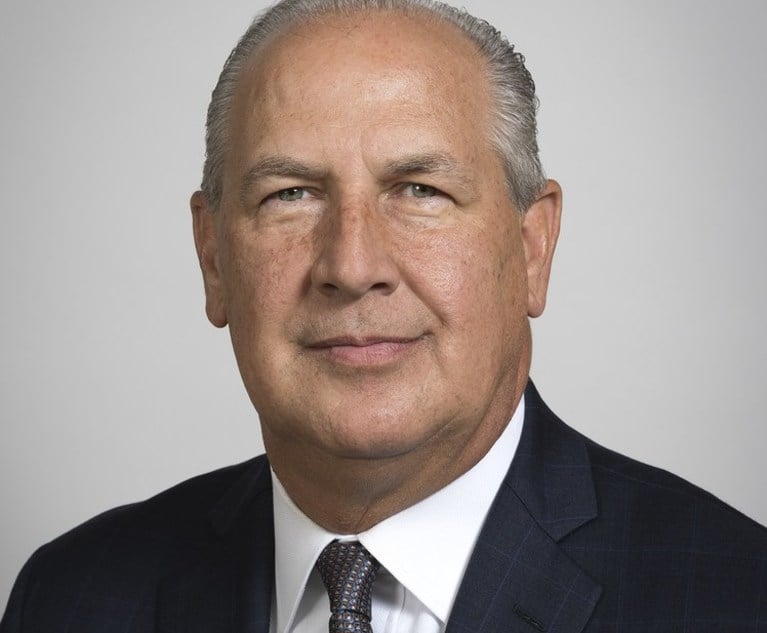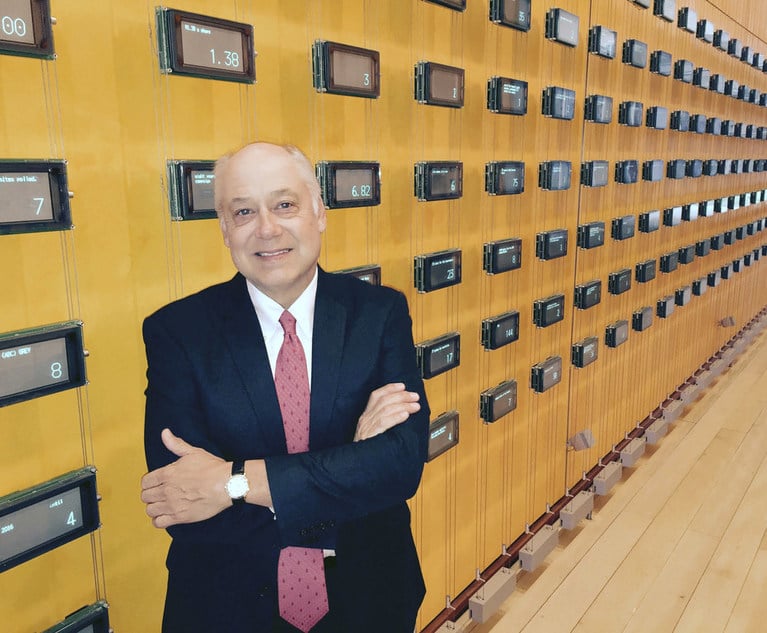Public Finance Practices Saw a Huge Boom at the End of 2017
One public finance practice leader said deal work was triple the normal amount in the fourth quarter.
March 21, 2018 at 07:31 PM
5 minute read
 Photo Credit: Shutterstock.com
Photo Credit: Shutterstock.com The end of 2017 came with a short-lived, but sweet surprise for law firms with public finance practices.
Those practice groups saw business explode in the fourth quarter, particularly in the last two months of the year, as legislators in Washington, D.C., debated a tax bill that had big implications for the tax-exempt market. The last such boom was more than 30 years ago, public finance lawyers said.
“It all was in a very compact period of time,” said Emilie Ninan, who chairs Ballard Spahr's public finance department. “There was this concern that as of the first of the year, we're not going to be able to do these deals anymore.”
The tax bill put an end to advance refunds for tax-exempt bonds, which was a way for public finance clients to take advantage of lower interest rates and save money. Marc Feller, chair of Dilworth Paxson's public finance group, said clients were “finding every conceivable bond that could generate savings” at the end of 2017, in anticipation of the tax bill prohibiting that activity in 2018.
Clients were also concerned that the new tax legislation would eliminate private activity bonds—a major source of financing for higher education, hospitals and other public institutions, Ninan said. That change was ultimately taken out of the final bill, but without knowing that would happen, nonprofit entities rushed to the market at the end of last year.
Mark Stewart, chair of Ballard Spahr, said the effect of last year's fourth-quarter public finance boom on the firm's revenue was “in the millions.”
Feller said his practice at Dilworth Paxson handled about $700 million in transactions in the last couple months of 2017, about double what it would normally do. As for the number of transactions completed in that time period, that was about three times the normal amount.
George Magnatta, Saul Ewing Arnstein & Lehr's public finance chair, said his practice group was about 60 percent busier at the end of last year than in a typical fourth quarter.
Magnatta and Feller said the last time they saw such a rush to market was in the mid-1980s, and that was also due to expected changes from the Tax Reform Act of 1986.
“People were working to the last minute of 1985 to get those deals done,” Feller said.
Burst of Activity
Of course tax lawyers were also burning the midnight oil at the end of 2017, and their practices haven't quieted as businesses (including law firms) search for ways to take advantage of the new law.
But the public finance boom of 2017 stopped as quickly as it started for many lawyers. Once the 2018 laws were in effect, there was no longer any reason to accelerate the financing schedule.
“That was extraordinary,” Ninan said. “I'm not expecting that to happen again.”
The lawyers said their practices experienced a slower than normal start in 2018, but things are picking back up a few months into the year.
“Of course we stole some volume from the first quarter of this year, so it was a little quieter in January, but things certainly picked back up thereafter,” Magnatta said. “Things are back to the regular pace for the first quarter.”
Deal volume will steady out, Ninan said. And that may not have been the case if private activity bonds had actually been eliminated.
“Given what was proposed to be on the chopping block and what ended up being chopped, we made it through pretty much unscathed,” Magnatta said.
The elimination of advance refunding will have some lasting effects. Feller said his firm saw a major uptick in advance refundings after the recession, and that activity will go away.
“That was a major part of our practice really probably over the last eight to nine years,” Feller said. “There's going to be a significant reduction in the volume of work that many of us see.”
Advance refundings have accounted for about 20 percent of all tax-exempt refunding activity, Ninan and Magnatta said. But they don't expect their practices to shrink by that amount.
“I think we'll make up that loss of 20 percent in some other ways of restructuring,” Ninan said. “There's always people thinking of new ways of structuring deals that are workable under the Tax Code.”
Feller said there are still a lot of construction and infrastructure projects that need to be completed, so there will still be transactions to do. And there has been an increase in municipalities looking to monetize their municipal assets, he said.
“We have other work that will fill the gap that is going to exist as a result of the decrease in bond transactions,” Feller said.
This content has been archived. It is available through our partners, LexisNexis® and Bloomberg Law.
To view this content, please continue to their sites.
Not a Lexis Subscriber?
Subscribe Now
Not a Bloomberg Law Subscriber?
Subscribe Now
NOT FOR REPRINT
© 2025 ALM Global, LLC, All Rights Reserved. Request academic re-use from www.copyright.com. All other uses, submit a request to [email protected]. For more information visit Asset & Logo Licensing.
You Might Like
View All
Montgomery McCracken Touts 'Record' Financial Performance Despite Shrinking Head Count
6 minute read
Class Action Settlements Totaled $40B+ Three Years in a Row: 'We’re in a New Era'
5 minute read
AI's Place in Big Law Broadens, As Firms Embrace Fresh Uses of the Technology
Trending Stories
Who Got The Work
J. Brugh Lower of Gibbons has entered an appearance for industrial equipment supplier Devco Corporation in a pending trademark infringement lawsuit. The suit, accusing the defendant of selling knock-off Graco products, was filed Dec. 18 in New Jersey District Court by Rivkin Radler on behalf of Graco Inc. and Graco Minnesota. The case, assigned to U.S. District Judge Zahid N. Quraishi, is 3:24-cv-11294, Graco Inc. et al v. Devco Corporation.
Who Got The Work
Rebecca Maller-Stein and Kent A. Yalowitz of Arnold & Porter Kaye Scholer have entered their appearances for Hanaco Venture Capital and its executives, Lior Prosor and David Frankel, in a pending securities lawsuit. The action, filed on Dec. 24 in New York Southern District Court by Zell, Aron & Co. on behalf of Goldeneye Advisors, accuses the defendants of negligently and fraudulently managing the plaintiff's $1 million investment. The case, assigned to U.S. District Judge Vernon S. Broderick, is 1:24-cv-09918, Goldeneye Advisors, LLC v. Hanaco Venture Capital, Ltd. et al.
Who Got The Work
Attorneys from A&O Shearman has stepped in as defense counsel for Toronto-Dominion Bank and other defendants in a pending securities class action. The suit, filed Dec. 11 in New York Southern District Court by Bleichmar Fonti & Auld, accuses the defendants of concealing the bank's 'pervasive' deficiencies in regards to its compliance with the Bank Secrecy Act and the quality of its anti-money laundering controls. The case, assigned to U.S. District Judge Arun Subramanian, is 1:24-cv-09445, Gonzalez v. The Toronto-Dominion Bank et al.
Who Got The Work
Crown Castle International, a Pennsylvania company providing shared communications infrastructure, has turned to Luke D. Wolf of Gordon Rees Scully Mansukhani to fend off a pending breach-of-contract lawsuit. The court action, filed Nov. 25 in Michigan Eastern District Court by Hooper Hathaway PC on behalf of The Town Residences LLC, accuses Crown Castle of failing to transfer approximately $30,000 in utility payments from T-Mobile in breach of a roof-top lease and assignment agreement. The case, assigned to U.S. District Judge Susan K. Declercq, is 2:24-cv-13131, The Town Residences LLC v. T-Mobile US, Inc. et al.
Who Got The Work
Wilfred P. Coronato and Daniel M. Schwartz of McCarter & English have stepped in as defense counsel to Electrolux Home Products Inc. in a pending product liability lawsuit. The court action, filed Nov. 26 in New York Eastern District Court by Poulos Lopiccolo PC and Nagel Rice LLP on behalf of David Stern, alleges that the defendant's refrigerators’ drawers and shelving repeatedly break and fall apart within months after purchase. The case, assigned to U.S. District Judge Joan M. Azrack, is 2:24-cv-08204, Stern v. Electrolux Home Products, Inc.
Featured Firms
Law Offices of Gary Martin Hays & Associates, P.C.
(470) 294-1674
Law Offices of Mark E. Salomone
(857) 444-6468
Smith & Hassler
(713) 739-1250






